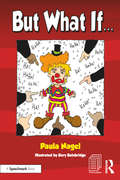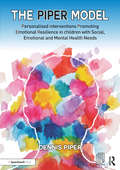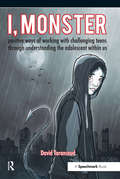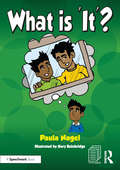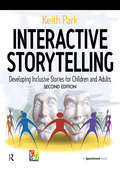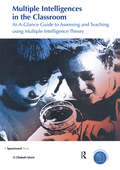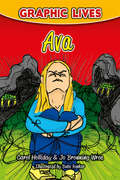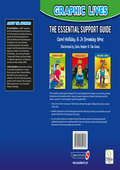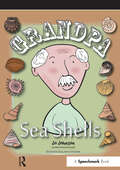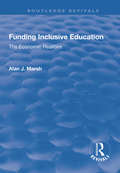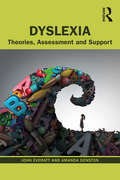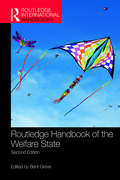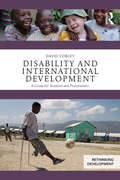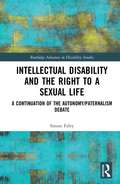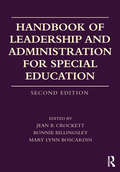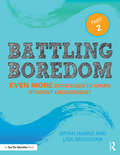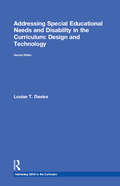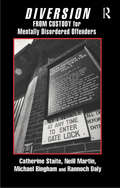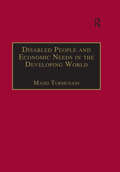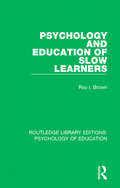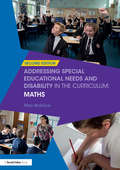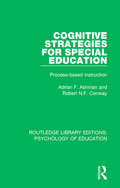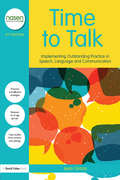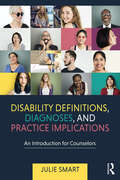- Table View
- List View
But What If: But What If...; Mind Reading; Stuck On A Loop; Waht Is It? (Rollercoaster Series)
by Paula NagelThis is a focus on worries about transition to secondary school. Jake is in Year 6. He is worried about the transition to secondary school because he has heard many rumours, including one about the older pupils flushing first years' heads down the toilets. The story illustrates how many of the pupils share similar worries about the impending transition even though their behavior looks different. Jake's behaviour illustrates his initial negative coping strategies as his worry grows. This includes not talking about it, opting out of his usual interests and activities, not sleeping and becoming angry with his mother. Some of his worries are alleviated on his taster visit to the new school, especially when he plucks up the courage to go into the boys' toilets. Following a misunderstanding in the toilets with some older boys, he is able to share his worries with another pupil and use humour to reflect on his behaviour. The accompanying, 'Let's talk about .worry,' text shares information and facts about mental health and transition. Paul Nagel has worked as an educational psychologist for 17 years. This has included working as a Lead Professional Educational Psychologist managing a traded service, as well as holding Senior Specialist posts for early years and disability. Over the years Paula has worked in multi agency teams within paediatric services, youth offending teams, Sure Start and an anti bullying service. She is currently Principal Educational Psychologist (North) for the national children's mental health charity, Place2Be. Before qualifying as an Educational Psychologist Paula was a primary school teacher. Gary Bainbridge is an artist, comics creator and secondary school Art, Photography and Media Studies teacher from Durham. He's best known for the North East based kitchen sink superhero comic Sugar Glider and the Newcastle-set crime fiction comic, Nightbus. Gary teaches at an academy in Northumberland.
The Piper Model: Personalised Interventions Promoting Emotional Resilience in children with Social, Emotional and Mental Health Needs
by Dennis PiperThis book is intended to be both a practical evidence-based tool and an awareness-raising resource for teachers, teaching assistants, mentors and all adults who work with children and young people who present as 'extremely challenging' in the school context. In every school there are a small number of pupils, less than five percent, who take up more than fifty percent of the staff's time. This book provides school staff with an approach to personalised interventions that enable those children or young people to build life-long resilience skills.
Really Useful ASD Transition Pack
by Alis HawkinsUsing snippets of practice-based theory, this title provides an overview of considerations as diverse as sensory sensitivities and their impact on the school day, how interactions in the playground might be handled and whether the pupil is allowed to eat separately, as well as teaching and learning issues.
I, Monster: Positive Ways of Working with Challenging Teens Through Understanding the Adolescent Within Us
by David TaransaudI, Monster is a resource for all professionals in health and education who work with challenging young people. The book aims to explain the issues behind challenging behaviour, to enable empathy, and to facilitate a more productive therapeutic relationship between the health/education professional and the child. I, Monster is divided into three parts. Part one suggests that our greatest foes lurk deep within ourselves, and that knowing our own darkness is the best method for dealing with the darkness of other people (Jung, 1973). Part two focuses on the inner world of adolescents who use aggression to manage early terrors. Part three explores approaches and strategies to help them heal the pain of the past. Full of case studies as well as coverage of key concepts and theory, this book offers a fascinating insight into the minds of the young people you work with.
What is it?: But What If...; Mind Reading; Stuck On A Loop; Waht Is It? (Rollercoaster Series)
by Paula NagelThis is a focus on low mood associated with bereavement. Sam feels low and fed up, but doesn't understand why he feels this way. Everyone else has an opinion on the change in his behaviour. His teacher thinks he is being lazy and can't be bothered to finish his work, his mum thinks he is moody and bad tempered, his friends think he is no fun any more and turning into a bore. Comments like, 'Cheer up it might never happen', ' What has got into you?' and 'Do you want to talk about it?' just upset him even more. He doesn't know what the 'it' is, that is making him feel this way. He didn't even feel this bad when his cousin died a year ago! When he is kept behind in class for not completing his work he tells the teacher how confused and sad he feels. Connections are made between his feelings and the looming anniversary of his cousin's death. Sam is helped to understand that thoughts and feelings associated with bereavement can come and go for a long time, and can cause strong emotions. He is shown how to notice and share his feelings and to think about things he can do when he feels this way. He makes a memory box so he can also remember all the happy things about his cousin. In the 'Let's talk about .sadness and loss,' section, feelings associated with bereavement and helpful coping strategies are shared. Paul Nagel has worked as an educational psychologist for 17 years. This has included working as a Lead Professional Educational Psychologist managing a traded service, as well as holding Senior Specialist posts for early years and disability. Over the years Paula has worked in multi agency teams within paediatric services, youth offending teams, Sure Start and an anti bullying service. She is currently Principal Educational Psychologist (North) for the national children's mental health charity, Place2Be. Before qualifying as an Educational Psychologist Paula was a primary school teacher. Gary Bainbridge is an artist, comics creator and secondary school Art, Photography and Media Studies teacher from Durham. He's best known for the North East based kitchen sink superhero comic Sugar Glider and the Newcastle-set crime fiction comic, Nightbus. Gary teaches at an academy in Northumberland.
Interactive Storytelling: Developing Inclusive Stories for Children and Adults
by Keith ParkInteractive storytelling, where the story is spoken or chanted, began as a way to include individuals with severe and profound learning disabilities in larger group activities, whether children at school or adults in day services. The stories are performed in call-and-response - one person calls out a line and the rest of the group respond either by calling back the same line or by calling out a pre-arranged response - and require no previous experience in drama or storytelling. They can be performed anywhere, by anyone. Various stories are explored, ranging from folktales and pantomime to poetry, the works of Charles Dickens, Shakespeare and stories from the Old Testament. Each extract details the full call-and-response for performing the story. This approach to storytelling can be used by teachers and group facilitators in a variety of settings and with any group of children or adults, irrespective of their level of disability. This hands-on manual will enable teachers, therapists, parents and anyone working with children or adults in community settings to use performance and recital to bring stories, drama and poetry to life for people of all abilities. 'This book is a useful resource...is simply written...is especially appropriate for people working with children and adults with speech, language and communication difficulties.' - Child Language Teaching and Therapy.
Multiple Intelligences in the Classroom
by Elizabeth MorrisHolistic approach to understanding and celebrating all the ways in which a child is intelligent. Suitable for schools, support workers and families, this resource offers support to children on their learning journey.
Graphic Lives: A Graphic Novel for Young Adults Dealing with an Eating Disorder (Graphic Lives)
by Jo Browning Wroe Carol Holliday Angeleen RenkerGraphic Lives is a series of highly engaging graphic novels for young people who may need counselling and psychotherapy. Each book introduces the difficulties faced by a teenage character and follows them as they travel on their therapeutic journey with a skilled and creative therapist. The key aims of these books are: to demystify counselling and psychotherapy so that it is more appealing and accessible to young people; to destigmatise emotional and mental health problems so that young people are better able to accept help; to encourage young people to embark upon their own healing journeys, equipped with the sense that there is a way forward. Sixteen year-olds Ava and Jade are obsessed with food, calories, and staying thin. Pleased with the many compliments they receive they push themselves into anorexia. Ava's mother is alarmed by her daughter's weight loss and forces her into therapy with the school counsellor, Steph. However after only two sessions Steph touches a raw nerve, Ava storms out and refuses to continue. Only when Jade is admitted to hospital does Ava return to therapy, where she begins to understand the causes of her anorexic tendencies.
Graphic Lives: Essential Support Guide (Graphic Lives)
by Carol Holliday Jo Browning WroeGraphic Lives is a series of highly engaging graphic novels for young people who may need counselling and psychotherapy. Each book introduces the difficulties faced by a teenage character and follows them as they travel on their therapeutic journey with a skilled and creative therapist. The key aims of these books are: to demystify counselling and psychotherapy so that it is more appealing and accessible to young people; to destigmatise emotional and mental health problems so that young people are better able to accept help; to encourage young people to embark upon their own healing journeys, equipped with the sense that there is a way forward. The essential support guide, designed to be used alongside the Graphic Lives novels, provides therapists and counsellors with a range of support resources, linked to the stories and the issues covered. For each graphic novel, this guide offers: clear and concise coverage of risk factors and warning signs relating to the issue covered in the story; detailed exploration of each therapeutic session in the story so that you can devise you own sessions that link to the therapy in the story; an up-to-date summary of research around the issue covered in the book along with professional guidance on working with that issue to help you achieve the best possible outcomes for the young people you work with.
Grandpa Seashells
by Jo Johnson'Grandpa Sea Shells' tells the story of three young children who spend a day with their grandparents after their grandfather has been diagnosed with dementia. The book is intended to support conversation at the time of first changes in a relative, a diagnosis of dementia and mild to moderate progression. Families and clinicians have told us this is the time period when they need material to support their explanations to children. Whilst the book could be used to start a conversation about any form of dementia, most of the key symptoms described in this story reflect the typical features associated with the Alzheimer's type, as this continues to be the most common. This book has been designed so that children of between four and ten can read it independently. Ideally it should be used with an adult to facilitate discussion about all aspects of family life and to enhance general emotional wellbeing. The book deliberately makes dementia one of many things going on for this family and highlights things that families can still enjoy together. We have included ideas for positive activities at the end of the book as well as puzzle and description pages that children can enjoy doing with a family member, teacher or clinician.
Funding Inclusive Education: The Economic Realities (Monitoring Change In Education Ser.)
by Alan J. MarshThis title was first published in 2003.Funding for pupils with special educational needs has created resource management difficulties for schools and budgetary control problems for LEAs. Special educational needs is a frequent area of LEA overspending. These issues are particularly important as the development of inclusion and raising attainment for all pupils are key Government priorities. Many LEAs are now considering revisions of their funding formulae for additional and special educational needs during Best Value Reviews and Fair Funding consultations. This stimulating and accessible book examines the policy context for formula funding and the design and accountability issues for the construction of a revised formula. One of the central themes is the idea that a funding formula should be viewed as a key instrument of policy to assist in delivering specific inclusive policy objectives to meet the additional and special educational needs of pupils.
Dyslexia: Theories, Assessment and Support
by John Everatt Amanda DenstonDyslexia: Theories, Assessment and Support offers a broad perspective on dyslexia, providing a range of views from theory to practice which help explain the continued controversy surrounding the condition. Offering a framework on which to understand the concept of dyslexia, the book considers procedures that can both identify the condition and help support those with it. With a focus on self-concept, the authors highlight ways to positively influence both literacy acquisition and individual well-being. This book is ideal reading for those taking courses on dyslexia or literacy learning difficulties within education, psychology and related disciplines. It will be of great interest to specialist teachers, special education staff, educational psychologists and those in related occupations.
Routledge Handbook of the Welfare State (Routledge International Handbooks)
by Bent GreveForty-five contributions from renowned international specialists in the field provide readers with expert analysis of the core issues related to the welfare state, including regional depictions of welfare states around the globe. The second edition of the Routledge Handbook of the Welfare State combines essays on methodologies, core concepts and central policy areas to produce a comprehensive understanding of what ‘the welfare state’ means around the world. In the aftermath of the credit crunch, the Handbook addresses some of the many questions about the welfare state. This second edition has been thoroughly revised and updated to include an in-depth analysis of societal changes in recent years. New articles can be found on topics such as: the impact of ideas, well-being, migration, globalisation, India, welfare typologies, homelessness and long-term care. This volume will be an invaluable reference book for students and scholars throughout the social sciences, particularly in sociology, social policy, public policy, international relations, politics and gender studies.
Disability and International Development: A Guide for Students and Practitioners (Rethinking Development)
by David CobleyDespite growing evidence of a close and complex relationship between disability and poverty, development policy, planning and programming has often failed to take full account of the concerns of disabled people. However, following the 2006 UN Convention on the Rights of Persons with Disabilities and the post-2015 sustainable development agenda, which promises to ‘leave no one behind’, there have been increasing calls from governments and development agencies for disability to be mainstreamed into all development planning. Disability and International Development provides a comprehensive overview of key themes in the field of disability and development, including issues around identity, poverty, disability rights, education, health, livelihoods, disaster recovery and approaches to researching disability. The book engages with relevant theory and draws on existing literature in the field, as well as the author’s own research and teaching experience, to explore key issues using a range of examples taken from around the world. Written in an accessible and engaging style to suit both students and practitioners, the book also includes a wide range of reflection exercises, discussion questions and further reading suggestions, making it the perfect introduction to disability and international development.
Intellectual Disability and the Right to a Sexual Life: A Continuation of the Autonomy/Paternalism Debate (Routledge Advances in Disability Studies)
by Simon FoleyOne of the perennial political/philosophical questions concerns whether it is ever justifiable for a third party to paternalistically restrict an adult’s freedom to ensure their own, or society’s, best interests are protected. Wherever one stands on this debate it remains the case that, unlike their non-impaired contemporaries, many intellectually disabled adults are subjected to a paternalistic regime of care. This is particularly the case regarding members of this population exercising more control of their sexuality. Utilizing rare empirical data, Foucault's theory of power and Kristeva’s concept of abjection, this work shows that many non-disabled people – including family members – hold ambivalent attitudes towards people with visible disabilities expressing their sexuality. Through a careful examination of the autonomy/paternalism debate this is the first book to provide an original, provocative and philosophically compelling analysis to argue that where necessary, facilitated sex with prostitutes should be included as part of a new regime of care to ensure that sexual needs are met. Intellectual Disability and the Right to a Sexual Life is essential reading for scholars, students and policy-makers with an interest in philosophy, sociology, political theory, social work, disability studies and sex studies. It will also be of interest to anybody who is a parent or a sibling of an adult with an intellectual disability and those with an interest in human rights and disability more generally.
Handbook of Leadership and Administration for Special Education
by Jean B. Crockett Bonnie Billingsley Mary Lynn BoscardinThe Handbook of Leadership and Administration for Special Education brings together research informing practice in leading special education from preschool through transition into postsecondary settings. The second edition of this comprehensive handbook has been fully updated to provide coverage of disability policy, historical roots, policy and legal perspectives, as well as effective, collaborative, and instructional leadership practices that support the administration of special education. It can be used as a reference volume for scholars, administrators, practitioners, and policy makers, as well as a textbook for graduate courses related to the administration of special education.
Battling Boredom, Part 2: Even More Strategies to Spark Student Engagement
by Bryan Harris Lisa BradshawDrive boredom out of your classroom—and keep it out—with the student engagement strategies in this book. In the first Battling Boredom, bestselling author Bryan Harris offered strategies on beginning a lesson, ending a lesson, small group work, and large group work. Now in Battling Boredom Part 2, Harris teams up with technology integration expert and former teacher Lisa Bradshaw to provide additional strategies on new topics such as academic talk, feedback, writing, classroom technology, and more. You’ll learn how to: Increase the quality and effectiveness of feedback to boost student performance. Engage students in meaningful reflection with writing prompts and exercises. Reenergize a lethargic class using movement-based activities. Integrate technology to create a more enriching classroom experience for students. Encourage students to speak up, share their ideas, and talk about their learning. With this toolbox of instructional strategies, you’ll have even more ways to end student boredom before it begins, resulting in class time that’s more efficient, more educational, and loads more fun!
Addressing Special Educational Needs and Disability in the Curriculum: Design And Technology (Addressing SEND in the Curriculum)
by Louise T. DaviesThe SEND Code of Practice (2015) reinforced the requirement that all teachers must meet the needs of all learners. This topical book provides practical, tried-and-tested strategies and resources that will support teachers in making design and technology lessons accessible and interesting for all pupils, including those with special educational needs. The author draws on a wealth of experience to share her understanding of special educational needs and disabilities and show how the design and technology teacher can reduce or remove any barriers to learning. Offering strategies that are specific to the context of design and technology teaching, this book will enable teachers to: better identify a student’s particular learning requirements; set inclusive design and making assignments which allow all students to participate and succeed; build students’ confidence in using a range of materials and tools; assist with design tasks where pupils take ownership of their work and learning; adapt the classroom environment to meet the needs of pupils; create a mutually supportive classroom which maximises learning opportunities. An invaluable tool for continuing professional development, this text will be essential for design and technology teachers (and their teaching assistants) seeking to include and motivate all pupils in their lessons, regardless of their individual needs. This book will also be of interest to secondary SENCOs, senior management teams and ITT providers. In addition to free online resources, a range of appendices provide design and technology teachers with a variety of pro forma and activity sheets to support effective teaching. This is an essential tool for design and technology teachers and teaching assistants, and will help to deliver successful, inclusive lessons for all pupils.
Diversion from Custody for Mentally Disordered Offenders: A Practical Guide
by Catherine Staite Neill Martin Rannoch DalyThe authors aim to provide practical guidance to enable practitioners in the various criminal justice, health and social care agencies to divert mentally disordered offenders from prosecution and custody and to help prevent re-offending.
Disabled People and Economic Needs in the Developing World: A Political Perspective from Jordan
by Majid TurmusaniThis book explores the economic situation of disabled people in developing countries focusing on rehabilitation and uses particpatory framework to community development. Although dealing specifically with a case study from Jordan, this needs assessment study provides comparisons with other developing societies. The author considers the prospect for future improvement in disability policy at a time when state budgets are already over stretched by widespread poverty, unemployment and poor health conditions. The book is divided into three parts. Part one explores disability and economic rehabilitation within global context and sets the scene for understanding what disability is and the impact of having disability across cultures with emphasis on the experience of discrimination. Part two deals with disability theory and practice in Jordan in terms of economic policies and provisions available for disabled people. Part three presents concluding remarks on the rise of disability politics in developing countries and the development of a participatory policy agenda.
Psychology and Education of Slow Learners (Routledge Library Editions: Psychology of Education)
by Roy I. BrownOriginally published in 1976, this introductory text for those intending to work with slow learners was concerned with the practical implications of recent British and North American research in the field of psychology and education at the time. Slow learners are young people who for a variety of reasons, continuously or for long periods, under-function in terms of intelligence, educational attainment and social skills. This book offers a clear analysis of the problems facing slow learners, their psychology and the types of education open to them. Dr Brown reassesses the needs of disabled children and adults in the context of their families, with the emphasis on the practical level of activity and training possible for them. The aim is the integration of the disabled person in society, and the belief is that services for the disabled should be integrated, with no professional person working on an isolated basis, but as part of a multidisciplinary professional team. Design for individuals entering the field of teaching, particularly those concerned with special education, training and rehabilitation programmes, the book should also be of value to social workers, psychologists and other professional people working in the field, as well as to parents of disabled children.
Addressing Special Educational Needs and Disability in the Curriculum: Maths (Addressing SEND in the Curriculum)
by Max WallaceThe SEND Code of Practice (2015) reinforced the requirement that all teachers must meet the needs of all learners. This topical book provides practical, tried and tested strategies and resources that will support teachers in making maths lessons accessible and interesting for all pupils, including those with special needs. The author draws on a wealth of experience to share his understanding of special educational needs and disabilities and show how the maths teacher can reduce or remove any barriers to learning. Offering strategies that are specific to the context of maths teaching, this book will enable teachers to: adopt a ‘problem solving’ approach to ensure students use and apply mathematics at all times during their learning develop students’ understanding of mathematical ideas structure lessons to empower and actively engage students create a mutually supportive classroom which maximises learning opportunities plan the classroom layout and display to enhance learning, for example displaying number lines, vocabulary lists and pupils’ work successfully train and fully use the support of their teaching assistants. An invaluable tool for continuing professional development, this text will be essential for secondary maths teachers (and their teaching assistants) seeking guidance specific to teaching maths to all pupils, regardless of their individual needs. This book will also be of interest to secondary SENCOs, senior management teams and ITT providers. In addition to free online resources, a range of appendices provide maths teachers with a variety of pro forma and activity sheets to support effective teaching. This is an essential tool for maths teachers and teaching assistants, and will help to deliver successful, inclusive lessons for all pupils.
Cognitive Strategies for Special Education: Process-Based Instruction (Routledge Library Editions: Psychology of Education)
by Adrian F. Ashman Robert N.F. ConwayResearch on training programs for students with learning difficulties has usually focused on the development of social and behavioural skills and the acquisition of cognitive interventions and procedures. Originally published in 1989, this book attempts to apply the methods validated by research and synthesize the discoveries made in the psychological laboratory for the benefit of teachers in regular classrooms. It reviews the literature relevant to special needs teaching and traces the development of cognitive research as it applies to education. The authors propose a specific and practical teaching strategy which has been successfully used by those working with students with special needs. Starting from the basic belief that education is an interactive process between the participants, the authors have emphasised the role and responsibility both of the teacher and the learner. Their book should be of value to researchers and practitioners in psychology and special education.
Time to Talk: Implementing Outstanding Practice in Speech, Language and Communication (nasen spotlight)
by Jean GrossTime to Talk provides a powerful and accessible resource for practitioners working to improve children’s language and communication skills. Showcasing effective approaches in schools and settings across the country from the early years through primary and secondary education, it summarises research on what helps children and young people develop good communication skills, and highlights the importance of key factors: a place to talk, a reason to talk and support for talk. This timely second edition has been fully updated to reflect Pupil Premium, curriculum, assessment and special needs reforms, and can be used by individual practitioners as well as supporting a whole-school or setting approach to spoken language. It includes: whole-class approaches to developing all children and young people’s speaking and listening skills; ‘catch-up’ strategies for those with limited language; ways of differentiating the curriculum for those with difficulties; ways in which settings and schools can develop an effective partnership with specialists to help children with more severe needs; models schools can use to commission their own speech and language therapy services; examples of good practice in supporting parents/carers to develop their children’s language skills; and answers to practitioners’ most frequently asked questions about speech and language. Now in full-colour, this practical and engaging book is for all who are concerned about how to help children and young people with limited language and communication skills – school leaders, teachers, early-years practitioners, and the speech and language therapists they work with.
Disability Definitions, Diagnoses, and Practice Implications: An Introduction for Counselors
by Julie Smart<p>This introductory text defines and describes disability, while providing concrete practice guidelines and recommendations for students in the fields of counseling, social work, and the helping professions. Various specialty areas are explored in detail, including marriage and family counseling, adolescent counseling, addictions counseling, LGBTQ concerns, multicultural counseling, and career counseling. <p>The first three chapters lay the foundations by discussing the demand for counseling services by individuals with all types of disabilities; presenting clinical, legal, medical/biological, and personal definitions of disability; and describing physical, cognitive, and psychiatric disabilities. Next, author Julie Smart examines core beliefs about disability using a range of first-person accounts from experienced counselors. The last six chapters focus on practice guidelines for various aspects of disability—including ethical considerations, societal issues, social role demands, and individual responses—and consider new possibilities for disability counseling professions. <p>With rich case studies woven throughout, as well as valuable information on client needs, disability categorizations, and key Models of Disability, this essential textbook will be useful not only to counseling students but also to professional counselors, social workers, and psychologists.</p>
